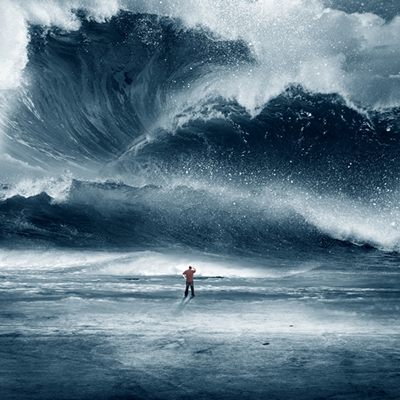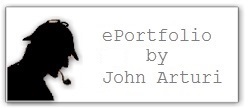
Image courtesy of Shutterstock
"Effort is only effort when it begins to hurt."
-Jose Ortega y Gassett-
What did I learn? Completing the requirements for this degree was the most arduous intellectual task I have ever undertaken. Monday through Friday, it was work and homework. On the weekend, it was all homework. On the holidays, there was some celebration, but still some homework. It never stopped:research,finish a paper,give a speech,and repeat. Endurance is the greatest virtue you must rely upon month after month. No,not anymore you think,I have had enough. Here comes another wave of journal articles and papers to be done.
Beyond the constant work,there is the undeniable fact that you must jump into the maze of technology. When I finished my BA in 2001 we still handed in a paper for an assignment. Now the paper has been complemented by the flash drive containing a power point presentation. The librarian is a combination of technophile,orator,and scholar. You might give a speech with only four hours of sleep the night before and after working a full day.
One difficulty in this profession is the enormous amount of material available to the researcher. The librarian has almost too many sources that might confuse a student. Perhaps the researcher,for example,wants information on the former president of Iran, Muhammed Mossadeq. The librarian locates the book,"The World Was Going Our Way:The KGB and the Battle for the Third World by:Christopher Andrew and Vasili Mitrokhin". In this source the authors exclaim about the overthrow of President Mossadeq,"Both Britain and,still more,the United States greatly exaggerated Mossadeq's susceptibility to Communist influence. When Dwight D. Eisenhower became President in January 1953, Sir Anthony Eden, the Foreign Secretary in Winston Churchill's government,found him 'obsessed by the fear of a Communist Iran'. Six months later the CIA and SIS jointly organized a coup which overthrew Mossadeq, and restored the authority of the Shah(2005, 169)."
In an article about this episode one scholar noted in the Dec. 2nd 2009 issue of The New Republic,"It was the clerical establishment's animosity toward Mossadegh that laid the groundwork for his ouster. A broad swath of clerics-Islamists like Ayatollah Abolgasem Kashani, a mentor of the Ayatollah Ruhollah Khomeini...". Further on the author proclaims,"None of this is to defend America's role in the coup. But it is hardly the only or even the decisive factor in his fall"(Milani,26-27). This is a good demonstration of how complex scholarship can be. The librarian cannot always tell the researcher which view is the better one, but can only present as many perspectives as possible on certain issues.
It is impossible for the librarian to be an expert in many fields. The best the librarian can do when asked to get information about a modern political issue or historical event is try to locate as many views, preferably peer reviewed,on the subject as possible. Now he or she should not overwhelm the student or scholar with sources. The librarian however has to be careful in providing "answers" to questions.
In providing information to the student or scholar, maybe the librarian should imitate the format of a book I own. The title of the book is,"A Guided Tour of the Collected Works of C.G. Jung" by Robert H. Hopcke. This book contains a little informaton on Carl Jung's major ideas. After a brief discussion of each idea there is a tiered system which starts with the phrase "To Begin" which includes papers and page numbers one can find even more of Jung's writing. Likewise the librarian should imitate this system. For example, a student might want a quick biography of Carl Jung. A scholar might Jung's detailed writing on the collective unconscious.
Concerning what projects made the biggest impact on me, the first was a project I did on Zoroastrianism. This project actually began with reading an article in the Oct. 15 2007 edition of the Chicago Tribune by Ron Grossman,et al. As I began to research further into this area, I was stunned by the amount of information available. The "Highway of Information" was composed of roads that led to books, journals, Zoroastrian testimonials, etc.
In my research I kept encountering the idea of dualism in Zoroastrianism. In the book,"Zoroastrians:Their Religious Beliefs and Practices" by:Mary Boyce, there are two scholars arguing against its presence in the religion,and one arguing in its favor. These scholars' views are in addition to those of the author! This is another great illustration of the abundance and contradictory evidence of information one finds in doing research.
The other project which made a significant impact on me was the bibliographic description of book by J. Hector St. John titled "Letters from an American Farmer". After reading some secondary sources about this book, I wanted to read it but of course had no time. In completing this project I was amazed at the interesting paths research can take you. In this project I also discovered new authors. I have often seen quotes from Samuel Johnson or Dr. Johnnson, and never really knew who these names referred to. By investigating of the publishers of the book "Letters from an American Farmer" I discovered that one of the publishers of the book was actually an acquaintance with Johnson's biographer, James Boswell!(Pascoe). Even the story of Thomas Davies,one of the publishers of "Letters..." was fascinating. I was unaware that there is so much information available on English publishers and booksellers. I wonder if the United States has similar publications about, booksellers, or even libraries?
Perhaps the greatest sadness that the librarian,who seems naturally to be a lover of knowledge, can realize is that their time is incredibly short. You amass all this information and scholarship about your subject and it just continues to flow forth and you realize a famous quote, "Art is Long and Life is Short". You have to move on.
I am hopeful that what I have offered as a sample of my work demonstrates a love of research and scholarship. Somewhat unintentionally, I believe the work represents me as a critic. Many of the articles involve an evaluation of sources, whether print or digital. If not always an appraisal of books or websites, they can also involve the estimation of the best methods of storage for these materials. It is my hope that the variety of offered opinons reflects a mind that is wide ranging in its interests.
When it comes to the greatest change I have witnessed while pursuing my degree, it has certainly been the greater reliance on digital information. It used to be that when you wanted to find information it was time to "hit the books". Now books are still relevant, yet journals have assumed a greater role in research. If someone wanted many views about a particular subject, I would direct them toward books, yet I would also have them look at journals and databases. For a good example of how sources have changed, look at the Encyclopedia Britannica. It is now online. If a student wanted to do a paper on Ernest Hemingway, he or she could read articles about him, yet they could also watch many documentaries about his life, all with the proper citation information.
Digital information has also helped the researcher to cross borders. Recently in a SERIALst email, a librarian from Chile gave information about an online service in English. A short time ago, I did research for a paper in which I emailed a retired librarian from England about a question concerning British publishers in the 18th century. Email has made contact with scholars easier for any researcher, no matter where they live.
In the comments about this website, I noted how the student will learn many languages in their studies. By studying legal, medical, and a bibliographic description course I have learned how just learning to search is not sufficient. In order to get what you want, or more likely what your patron wants, you need to know the language of the land. In a description of MeSH and subject headings this is explained precisely by the following quote from M. Swanson, "From another point of view, in subject headings conceived of as pointers, rather than labels, a certain amount of ambivalence is tolerable. Suppose, for example, we find a sign reading 'San Francisco' pointing west on Independence Avenue in Washington,DC. This would not be very helpful. If, however, we see the same sign on the outskirts of Sacremento, it is likely to be very helpful indeed.". Although I am slightly twisting the meaning of this quote, I believe it is an excellent illustration of the fact that you have to know the language in order to find what you are looking for.
Bibliography
Andrew,Christopher and Vasili Mitrokhin. 2005. The World was Going Our Way: The KGB and the battle for the Third World. New York: Basic Books.
Boyce, Mary. 2010. Zoroastrians:Their Religious Beliefs and Practices. Routledge:London.
Gassett,Jose Ortega y. "Quotations about Effort." The Quote Garden.www.quotegarden.com/effort.html.
Grossman,Ron et al. "Keeping their faith's flame lit: Young Zoroastrians fear for the future of a religion that shaped other faiths.". Chicago Tribune. Oct. 15,2007. www.archives.chicagotribune.com.
Hopcke,Robert H. 1992. A Guided Tour of The Collected Works of C.G. Jung. Foreward by Aryeh Maidenbaum. Boston:Shambhala.
Milani,Abbas. "The Great Satan Myth:Everything you know about U.S. involvement in Iran is wrong". The New Republic, Dec. 2,2009. 26-28.
Pascoe,Charles Eyre. The Joyous Neighborhood of Covent Garden:A Literary Souvenir of the Tavistock Hotel,Done in Celebration of its Hundreth Anniversary. 1887. Tooks Court,Chancery Lane. The Chiswick Press. Tufts Digital Library. http://hdl.handle.net/10427ƫ14790.
Swanson,M. 1959. J Bowman Gray Sch Med. 17:45-9. Cited in "History of MeSH" Preface 2011. http://www.nlm.nih.gov/mesh/intro_preface.html.
- E-Portfolio Introduction
- Reflective Essay
- I. Need Information?
- II. a. Ethics
- II. b. Westlaw Research Paper
- III. Neuroscience Resources
- IV. Print or Electronic Serials?
- V. a. Project Muse
- V. b. Zoroastrianism
- VI. Bureaucracy and Scientific Management
- VII. a. For Further Research: Goldman Sachs
- VII. b. Letters From An American Farmer: Bibliographic Description
